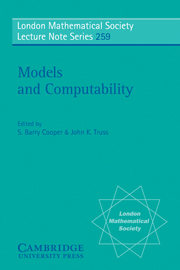Book contents
- Frontmatter
- Contents
- Preface
- Continuous Functionals of Dependent and Transfinite Types
- Degree-Theoretic Aspects of Computably Enumerable Reals
- Simplicity and Independence for Pseudo-Algebraically Closed Fields
- Clockwork or Turing U/universe? - Remarks on Causal Determinism and Computability
- A Techniques Oriented Survey of Bounded Queries
- Relative Categoricity in Abelian Groups
- Computability and Complexity Revisited
- Effective Model Theory: The Number of Models and Their Complexity
- A Survey on Canonical Bases in Simple Theories
- True Approximations and Models of Arithmetic
- On the Topological Stability Conjecture
- A Mahlo-Universe of Effective Domains with Totality
- Logic and Decision Making
- The Sheaf of Locally Definable Scalars over a Ring
- Human Styles of Quantificational Reasoning
- Recursion Theoretic Memories 1954–1978
- Fields Definable in Simple Groups
- A Combinatory Algebra for Sequential Functionals of Finite Type
- Model Theory of Analytic and Smooth Functions
Degree-Theoretic Aspects of Computably Enumerable Reals
Published online by Cambridge University Press: 17 May 2010
- Frontmatter
- Contents
- Preface
- Continuous Functionals of Dependent and Transfinite Types
- Degree-Theoretic Aspects of Computably Enumerable Reals
- Simplicity and Independence for Pseudo-Algebraically Closed Fields
- Clockwork or Turing U/universe? - Remarks on Causal Determinism and Computability
- A Techniques Oriented Survey of Bounded Queries
- Relative Categoricity in Abelian Groups
- Computability and Complexity Revisited
- Effective Model Theory: The Number of Models and Their Complexity
- A Survey on Canonical Bases in Simple Theories
- True Approximations and Models of Arithmetic
- On the Topological Stability Conjecture
- A Mahlo-Universe of Effective Domains with Totality
- Logic and Decision Making
- The Sheaf of Locally Definable Scalars over a Ring
- Human Styles of Quantificational Reasoning
- Recursion Theoretic Memories 1954–1978
- Fields Definable in Simple Groups
- A Combinatory Algebra for Sequential Functionals of Finite Type
- Model Theory of Analytic and Smooth Functions
Summary
Abstract
A real α is computable if its left cut, L(α), is computable. If (qi)i is a computable sequence of rationals computably converging to α, then {qi}, the corresponding set, is always computable. A computably enumerable (c.e.) real α is a real which is the limit of an increasing computable sequence of rationals. It has a left cut which is c.e. We study the Turing degrees of representations of c.e. reals, that is the degrees of increasing computable sequences converging to α. For example, every representation A of α is Turing reducible to L(α). Every noncomputable c.e. real has both a computable representation and a noncomputable representation of degree degTL(α). In fact, the representations of any noncomputable c.e. real are downwards dense, and yet not every c.e. Turing degree below degTL(α) necessarily contains a representation of α.
Introduction
Computability theory essentially studies the relative computability of sets of natural numbers. Since Gödel introduced a method for coding structures using natural numbers, computability has been applied to many areas of mathematics, for example, to the theory of linear orders, to group theory and to real analysis. In this paper we will consider an application of computability theory to the real numbers.
The real numbers ℝ may be defiend in several different ways. In classical analysis, the reals are those entities which are the limit of a Cauchy sequence. In mathematical logic the real numbers are defined as Dedekind cuts of sets.
- Type
- Chapter
- Information
- Models and Computability , pp. 23 - 40Publisher: Cambridge University PressPrint publication year: 1999
- 7
- Cited by



